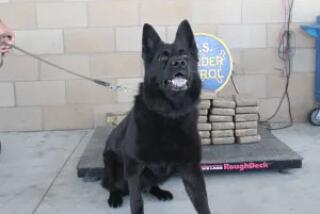Drug Dog Hangs Up His Badge : Sheriff’s Chief Sniffer Forced Into Retirement
- Share via
SANTA ANA — Special Agent Winston is hanging up his badge.
After eight years’ service as the county’s first and still most prolific drug-sniffing dog, the 9-year-old yellow Labrador is heading into a life of lazy afternoons with his retirement Friday from the Orange County Sheriff’s Department.
Winston kicked off the county’s canine narcotics program in September, 1982, and has since been credited with sniffing out more than $80 million in drugs and cash. He has been praised by judges and damned by drug dealers, and his legacy will be an expanded drug-sniffing program that has won the respect of law enforcement officers across the country.
But the years have caught up with Winston, and his short, sandy-yellow fur has lightened and even whitened in places since that day eight years ago when he was a rookie cop. His moves aren’t as plentiful or as graceful as they used to be, though the 87-pound purebred still has no problem leaping onto low walls and performing his duties on command.
But the glamorous life of a sheriff’s investigator has taken its toll on both beast and man, leading Winston and his handler, sheriff’s investigator Don Lambert, to look forward to Winston’s retirement.
“It’s been a lot of fun, interesting these last eight years,” Lambert said of his live-in partner. “He’s just getting old. . . . The work takes a toll on him. It’s very stressful. I can see the aging in him, around the muzzle and eyes.”
“He creaks and cracks just like I do when I get up in the morning,” added the 45-year-old Lambert, who will be reassigned to a position out of narcotics when Winston retires to Lambert’s yard.
Lambert characterized Winston as a late-bloomer who got off to an inauspicious start as a insolent pup.
He was once a “juvenile delinquent” kicked out of at least one kennel because of an aggressive, independent attitude that made him too difficult to train. Only when a second kennel owner recognized that his attitude could be harnessed for detecting drugs was Winston shipped off to be trained for a demanding career as a sheriff’s investigator.
“He was a juvenile delinquent as far as dogs go,” said Lambert. “He was bred as a show dog, but he didn’t have the aptitude or the attitude. He literally ate his way out of several homes. And then one kennel shipped him out because he had attitude problems. He’s very aloof around people, very independent, somewhat of a knucklehead.”
But Winston found his niche sniffing out drugs, and his retirement leaves his admirers wondering if there will ever be another like him.
“Whoever comes after him will have to live up to him,” said Capt. Tim Simon, head of the Regional Narcotics Suppression Program, a multi-agency task force of local and federal law enforcement officers in Orange County. “You can think of him as a superstar.”
So ends a career dotted with major drug seizures--including some of the biggest of their time--and some not-so-major cases, all of which helped fight the multibillion-dollar war on drugs.
“Sometimes, a dog will hit on something, and you wonder, ‘How in the world did he find that?’ ” Lambert marveled. “Dogs have an amazing nose, though the experts don’t all agree. Experts range from just saying they are better (than human noses) to saying they are 300,000 times better.”
Many times, Lambert said, the dogs are not sniffing out the actual package of drugs, but rather traces of them left on containers or hands. Often, those traces are about one-tenth of a microgram--an amount so minute humans cannot see or feel it, Lambert said.
Winston has discovered cocaine, heroin, marijuana and other drugs sealed in mason jars locked in strong boxes underneath cars, hidden in the bottoms of aerosol cans surrounded by mothballs, sealed in airtight plastic bags in special compartments behind record albums.
“Winston was the front-runner in the dog-sniffing program because of the cases he’s worked, the respect of the judiciary and the notoriety he’s achieved through the years,” Lambert said. “He is a recognized expert by many courts. And he’s made the narcotics-sniffing program from this department far more than anyone envisioned in 1982. Because of his success, many other departments in Southern California and around the country have started dog programs of their own.”
Winston started working the day he got home from the kennel and handled an average of 15 searches a month, Lambert said, finding drugs or drug-tainted money 98% of the time. When he finds the source of his scent, he will scratch at the area with his front paws until he gets it out or until a police officer takes over.
And his payment for all that hard work? A little quality play time, complete with an old dish rag or an 8-inch piece of duct-taped fire hose.
In Garden Grove several years ago, police obtained a search warrant to check a known dealer’s home. When they couldn’t find anything, they called Winston, who discovered drugs hidden in the bottoms of two scuba tanks hidden in a closet. Police officers felt that since the air valves worked--the tanks were half full--there were no drugs hidden inside.
But Winston’s nose knew the difference, a prowess which has won him recognition among some of the county’s judges as being a very reliable source.
Winston’s success has not only earned him respect from law enforcement and judicial agencies but hatred from the drug community.
“Winston had a contract out on him early in his career over an incident at the (Orange County) airport,” Lambert said. Rumors had it that a dealer from Texas wanted Winston dead and was offering $50,000 to ensure it.
“He’s been an excellent partner, but it’s time to move on to something else,” Lambert said. “I won’t say no, (I won’t work with him again), but I think we’re going to leave it to the younger fellas.”
More to Read
Sign up for Essential California
The most important California stories and recommendations in your inbox every morning.
You may occasionally receive promotional content from the Los Angeles Times.










